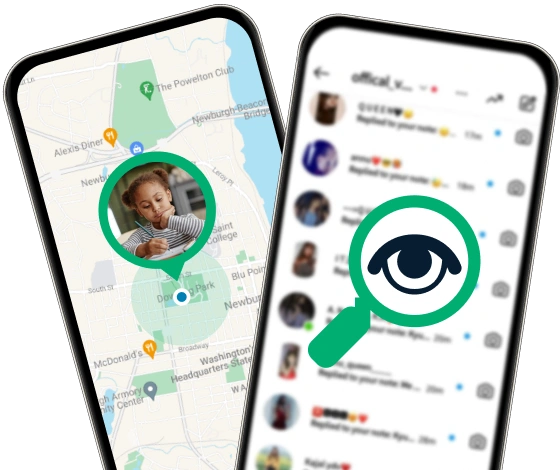Young people planning to have children think a lot about their parenting approach. They have their own mom and dad as examples, and they can learn from their mistakes. Well, theoretically. The point is that nowadays, there is a huge pressure from society that dictates its own rules. If you are not a gentle parent, you are a bad one, but… What is gentle parenting, and how can it be combined with safety and parental controls? Let’s find out!
What Is Gentle Parenting and How Does It Work?
So, the gentle parenting approach, what does it have in its essence? Of all parenting styles, this is the softest and most cooperative. Sarah Ockwell-Smith first introduced gentle parenting, which was aimed at building trustful and cooperative relationships between parents and children. This parenting style stands on 4 cornerstones: empathy, boundaries, understanding, and respect.
Empathy
Empathy is essential for a gentle parenting style as it helps to develop an emotionally healthy and compassionate personality. Of course, empathy is taught by example. Thus, parents must demonstrate how it works and be emphatic themselves: be involved in their child’s life, share their emotions, and show interest in their development. It helps a child to develop self-confidence and live in harmony with the environment and society.
Boundaries
A gentle parent must respect their children’s boundaries and teach them that they must preserve them themselves. It will teach them to say “no” and protect their interests, refuse to take part in something they do not really like, and avoid unhealthy contact with strangers. It is a huge problem for people of older generations: they were taught to be “comfortable” for others, which is why they do not have the very idea of personal boundaries.
Understanding
If you ask any parent: “Do you understand your child?” the answer would most probably be, “Yes!’ However, if you ask a child: “Do you think your parent understands you?” you would often hear “No!” It is not enough to think that everything is fine. Talk to your children, share their feelings, and participate in their lives – it is the only way to understand them.
Respect
It may sound weird, but many parents choose being passive aggressive instead of respectful. It is much easier to tell your children that they are too young, they have no idea about life, they will understand when they grow up, etc. It is much more difficult to show respect and take into account your children’s opinions and thoughts. However, being difficult does not mean you should not work on it.
What Are Other Parenting Methods and How Does Gentle Parenting Differ?
The gentle parenting approach is not considered the classic one; there are “standard” types of parenting. Some are more popular than others, so do not expect an even distribution here. According to the survey by the University of Pennsylvania, the numbers are the following:
| Parenting style | Percentage in America |
| Authoritative parenting style | 46-49% |
| Authoritarian parenting style | 23-26% |
| Permissive parenting style | 18-20% |
| Neglectful parenting style | 8-10% |
There are two big “BUTs” about these results, though:
- they are true only for the US;
- they do not consider modern tendencies.
Thus, the distribution may be different in other countries. Also, young and modern parents may not accept an authoritarian style, insisting on a more open and trustworthy parent-child relationship.
Authoritative Parenting
Authoritative parenting is the closest to soft parenting and may even be called an ancestor of gentle parenting. Authoritative parents want their children to grow up independent and knowledgeable. They give their children considerable freedom but with some limits, and they always try to explain the reasons for these limits. Such parents can be compared to shepherds: they rest in the shadow of a tree, letting their cattle do what it wants, but in case of danger, they run to their flock and take the situation under control.
Authoritarian Parenting
The best way to describe this style of parenting is to request much, control more, and give nothing. Authoritarian parents are cold and distanced. They want the best for their kids, no doubt; at the same time, such parents use the carrot and stick technique, but without carrot. They are sure gentle parenting doesn’t work and place their personality and authority above anything else. Such a style is often called toxic parenting because of all these features.
Permissive Parenting
Permissive parenting suggests maximum freedom and minimum parental control (although some still exist). Permissive parents play a big part in their child’s life, allowing them to experiment and do almost whatever they want. You may ask, what is the difference between this and the authoritative style? Well, permissive parents want to be friends with their little ones; they avoid saying “no” and are ready to forgive almost everything.
Neglectful Parenting
Neglectful parenting is one of the most controversial styles of parenting. Its key feature is that parents help their children only with their basic needs – food, clothing, etc. – and ignore everything else, leaving their little ones alone versus the world. This may lead to childhood anxiety and a lack of trust in the future, but it is definitely the easiest way for parents to focus on their own lives – ignore the child.
Gentle Parenting

Gentle parenting style is all about cooperation, mutual respect, and help. Parents are involved in the lives of their children; they take an active part in it, and they help with everything (help, not do everything for their children). This style is about sharing feelings and emotions, better understanding your children’s problems, supporting them, and searching for solutions together.
How to Incorporate Gentle Parenting in Your Everyday Life
If you are thinking about becoming a gentle parent – here are some crucial guidelines you must follow.
- No personal judgement. You only give your comments on the result, not on a person. If your child did something great – what a great job! If something went wrong – it may have been better if. Forget the word “you” when discussing what your child did. You want to improve the result, not blame the person.
- Be kind. First, model a kind and supportive environment by yourself. Help your spouse, take care of your kid, and give others a gentle parenting example!
- Invite instead of commanding. Invite your children to do something with you. Give them a choice and some flexibility, let them adjust the task to their needs and abilities, and be ready to provide all possible assistance.
- Positive encouragement. Do not make negative comments about your children’s work. Even if it is not impressive, find something to praise them for and then offer your assistance in improving the result.
Gentle Parenting Pros and Cons
Gentle parenting seems like a great style, and, in fact, it is, but something could be better in this world, and even gentle parenting techniques have their advantages and disadvantages.
Pros:
- it promotes empathy and respect;
- it develops communicative skills and decreases social anxiety;
- it teaches children to set up their boundaries.
Cons:
- lack of firm education structure;
- children may not develop their coping skills as they are not used to acting independently.
Benefits of Parental Controls for Gentle Parenting

As gentle parenting is all about cooperation and mutual understanding, many parents struggle with setting up age-appropriate limitations when the time comes. As a result, teenagers may spend 90% of their free time on social media, ignoring everything their mom or dad says because adults try to share their child’s feelings and offer their emotional support, and their teenage “baby” has already started the separation process.
It is one of the main problems with gentle parenting; luckily, there is a great solution in the form of parental controls and monitoring. According to a Jama Network study, it has already proven to be safe and effective, and it allows parents to ensure their kids’ safety and limit their internet activity, not intruding aggressively in their safety bubble.
Using parental control and spy apps, you can check messages, see contacts, and know about your children’s plans. However, if you really wonder how to gentle parent, you must understand that such controls are aimed only at providing safety and should not be used to peek into your son’s or daughter’s personal life. They are personalities, and they have all the rights to have their own interests, and you, as a parent, must ensure nothing bad happens to them.
uMobix as Your Main Gentle Parenting Assistant

uMobix is a cell phone tracker that does gentle parenting work much easier. Before we dive into its abilities, let us highlight one more time that as a gentle parent, you only use parental controls to ensure safety, not to spy.
So, uMobix has a good set of features that can be useful to any gentle parent.
- GPS tracking. It allows you to have peace of mind and stay in the loop about their whereabouts at the same time. It eliminates one of the main drawbacks to a gentle parenting style – a lack of parental control and discipline.
- Social networks tracking. Children, especially teenagers, spend a lot of time on social media, and you never know who they talk with. If they are discussing a date with their partner, that is fine, but if a shady adult with an empty profile texts them, you would be happy to know about it. We’ve done the legwork for you and gathered useful ways to set parental controls:
- Snapchat parental controls
- Facebook parental controls
- Instagram parental controls
- TikTok parental controls
- YouTube parental controls
- iPhone parental controls
- Android parental controls
- Funds controls. A common issue with children is that they spend tons of cash on games and loot boxes. While, as a gentle parent, you do not want to ban such things completely, you also do not want to have a debt on your credit card. Thus, it is better to be safe on this side.
uMobix and other similar trackers have many other features that help you establish gentle parenting discipline. If you want to try it – ask a support agent for a free trial and see if it works.
Balancing Safety and Privacy as a Gentle Parent

We have already raised this question, but we would like to pay more attention to it. The main difference between gentle parenting vs. traditional parenting is trust and respect, and if you spy on your child, it essentially goes against all gentle parenting guidelines.
On the other hand, you do not want to blame yourself for the rest of your life if something happens to your little one. Thus, you should find the balance between safety and privacy, and we have a few recommendations for you.
- Set alarms for specific/unknown numbers so that you do not listen to the conversations with friends but get notified if something unusual occurs.
- Set geofencing to be informed when your child enters the undesired zone or leaves the area where they are supposed to be.
- Set up application controls to know how much time they spend on Facebook or playing games.
Using Technology as Your Parenting Assistant to Build Independence
When you decide that you are bringing up an independent personality and do not need to control anything – it turns into indulgent parenting. As a mother or father, you are responsible for your child’s life and safety, no matter what parenting style you use, and there is nothing bad in using technology to assist you with that. And if you know how to use it correctly – you will still be able to nurture all the qualities you want and be sure nothing bad happens.
FAQ
You only know once you try. Generally, almost every research on gentle parenting claims that there is nothing harmful about it, and if you feel it does not fit you or your child – you can always switch to another style.
There is no right or wrong answer to it. Of course, every parent wants to monitor their child's phone forever, no matter what their age is. But you should respect their privacy. There are two main opinions on this question, though: when a child starts living on their own or when a child gets married.
One of the main signs of cyberbullying is anger issues in children. If you notice that your child is getting depressed after surfing the Internet and reacts aggressively to all your questions and tries to understand what happened – you should be alarmed and set up parental controls.
Yes, you can. One of the most decent phone trackers for Android and iOS is uMobix. It has many useful monitoring features, works in stealth mode, and is completely anonymous.

Latest posts
- 10 Best Apps for Parents to Monitor Social Media: 2026 Guide
- Complete List of Keywords to Block for Parental Control
- Does Telegram Notify Screenshots? Everything About Screenshot Detection
- How to Find Someone’s Deleted Instagram Posts: Complete Guide
- Family Tracking App by uMobix: Keep Loved Ones Safe




